Extract from The Guardian

In a press conference lasting almost an hour on Wednesday, we heard the former prime minister outline his defence for the extraordinary decision to secretly take on five portfolios in addition to his own for much of his prime ministership.
On Planet Morrison, these were the actions of a hero – a man who took his responsibilities so seriously that he was prepared to take on the burden of other portfolios just in case he was needed.
He did it for you, not him, you understand?
Scott Morrison defends secret portfolios as ‘necessary’ and refuses to resign – video
Indeed, this is what the public expected of him, he claimed. The public, the media and the opposition held him responsible for “every single thing that was going on, every drop of rain, every strain of the virus, everything that occurred over that period of time”.
In this fantasy land, the public apparently elected Morrison not as the member for Cook in a representative democracy, but as their micromanaging supreme leader, someone prepared to grab power wherever possible in order to respond to the demands of the pandemic.
The extraordinary context of the time made the actions perfectly reasonable, Morrison contended.
But – stay with me here – the logic was so flawless, the demand for his superpowers so great, that he could not tell anyone. Not the public, who were apparently clamouring for him to take on more power, and certainly not his cabinet colleagues, who might “misconstrue” his benevolent gesture as some sort of madcap power play.
“I was concerned these issues could have been misconstrued and misunderstood, and undermine the confidence of ministers in the performance of their duties at that time, and I did not consider that to be in the country’s interest.”
Well, yes – it’s kind of like finding out you’re the victim of identity theft, but they haven’t used the credit card yet.
The cognitive dissonance of Morrison’s defence is mind-boggling. On one hand, he wants us to believe the actions were perfectly rational and justified in the context, while on the other he admits he could not tell his colleagues about the arrangements because he knew they would be shocked and unhappy.
Morrison admitted on Wednesday he told nobody of the appointments after health – the plan was hatched between his office and his department, with signoff from the governor general. After initially suggesting it was an oversight not to have told ministers he had signed up to their portfolios, Morrison made clear on Wednesday that the information was in fact deliberately concealed from cabinet. Perhaps deep down a conscience lurks after all.
Morrison also insists that everything was actually fine because he never used the powers he assigned himself, which shows just how responsible and clever he was after all. Silly us not to recognise it.
“You mightn’t understand it because you haven’t been a prime minister in the middle of the worst crisis since the second world war,” Morrison told Sky News’s Andrew Clennell, revealing, once more, his belief that he is always the smartest person in the room.
Never mind that Australia’s wartime prime ministers did not feel the need to give themselves the same portfolio delegations, nor any other prime minister in Australia’s history, who have all been prepared to stick with the primacy of the cabinet in the Westminster system, in which the prime minister was traditionally seen as “first among equals”.
Morrison’s attempted explanation also reveals his portfolio stash was carefully curated – he only wanted those which had the “unilateral decision-making powers of ministers”. That is, only portfolios that gave the minister the final say.
We know that in the one instance that Morrison did use his powers, it was to overrule a decision of resources minister Keith Pitt that he did not like because of its political implications in the lead-up to the election.
We may never know if Morrison had similar intentions with other portfolios; if his “break glass in case of emergency” powers were genuinely related to the pandemic, or if Morrison had an eye on other political spot fires he wanted to control.
No one is questioning that Morrison was prime minister in unusual times – times that, as he said, tested “every sinew and fabric of government”.
But that did not require a rewrite of the system. It was the very time to ensure that the structure of Australia’s parliament remained respected and robust – and its elected members accountable. On that test, Morrison comprehensively failed.
The member for Cook’s lack of contrition and lack of self-reflection on Wednesday was hardly surprising – they are the hallmarks of the man. But his attempt to use this fiasco to paint himself as some kind of enlightened statesman, the country’s messiah, is beyond the pale.

No comments:
Post a Comment